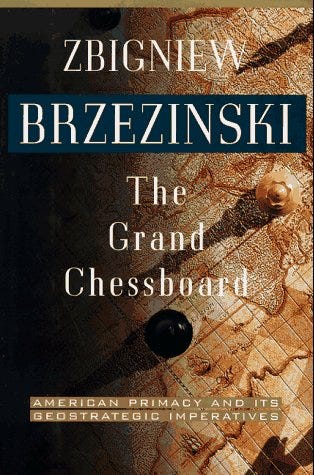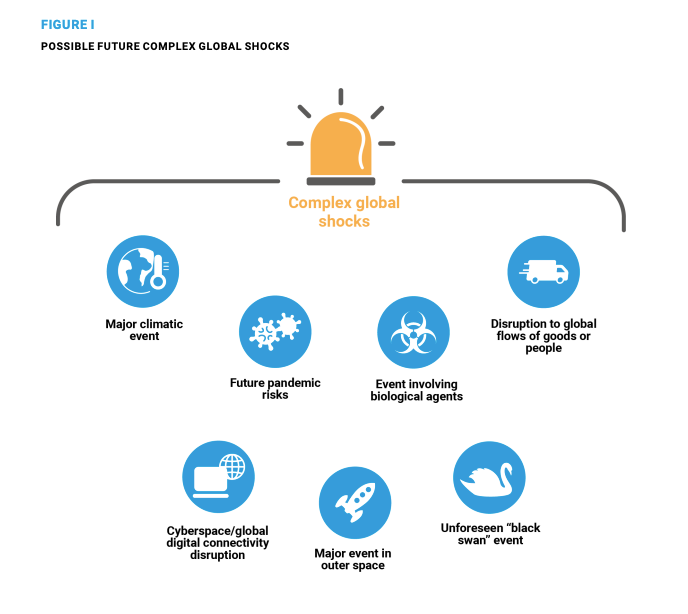Russia, Ukraine and the Emergence of a New Global Management Regime
Part I: Zbigniew Brzezinski and The Grand Chessboard

All Global Research articles can be read in 51 languages by activating the Translate Website button below the author’s name.
To receive Global Research’s Daily Newsletter (selected articles), click here.
Click the share button above to email/forward this article to your friends and colleagues. Follow us on Instagram and Twitter and subscribe to our Telegram Channel. Feel free to repost and share widely Global Research articles.
***
The geostrategist Zbigniew Brzezinski (1928-2017), security adviser to President Jimmy Carter and co-founder of the Trilateral Commission, describes in his book The Grand Chessboard (1997) the challenges of the American empire as the only remaining superpower after the fall of the Soviet Union. Not least this is about the Middle East and Russia. In the book the control of Ukraine gets a lot of space. The country is considered to have great strategic importance as it is part of the Eurasian heartland and forms a bridge between Europe and Russia. According to British geostrategist Halford MacKinders (1861-1947) Heartland-theory, this area is the key to controlling the world.
Who rules East Europe commands the Heartland; who rules the Heartland commands the World-Island; who rules the World-Island controls the world. (Halford Mackinder)
It was also a reason for Hitler’s aspiration to take control and dominate parts of the Russian sphere of interest (an aspiration that the Germans also had during the First World War and their idea of ”Central Europe”). According to Brzezinski’s analysis, it was of the utmost importance for the US to increase its influence in Ukraine in order to achieve this goal.
Ukraine, a new and important space on the Eurasian chessboard, is a geopolitical pivot because its very existence as an independent country helps to transform Russia. Without Ukraine, Russia ceases to be an Eurasian empire.
This is about building closer cooperation between Ukraine and Europe. If instead Russia gained control, the balance of power would tip over in their favor. For the United States, it was also about preventing a rapprochement between Germany and the Kremlin, which in the long run would risk leading to a loss of the American bridgehead in Europe. According to Brzezinski, America’s geostrategic goals for Europe were to:
…consolidate through a more genuine transatlantic partnership the U.S. bridgehead on the Eurasian continent so that an enlarging Europa can become a more viable springboard for projecting into Eurasia the international democratic and cooperative order.
 In the book’s conclusions, Brzezinski writes that the United States’ time as the only superpower, within a generation, is coming to an end. The goal is to create a geopolitical structure in the face of this that can handle “inevitable shocks and stresses”.
In the book’s conclusions, Brzezinski writes that the United States’ time as the only superpower, within a generation, is coming to an end. The goal is to create a geopolitical structure in the face of this that can handle “inevitable shocks and stresses”.
This should ultimately lead to a new global “peaceful” management system, with an upgraded UN, able to shoulder the former regent’s mantle.
This coincides with the emergence of the G20 (1999), the World Economic Forum as the leading public-private partnership organization (2015), the partnership between these global corporate interests and the United Nations (2019) and the ongoing reform efforts to create an effective multilateral world system (UN Our Common Agenda) with an “emergency platform” that can handle “extreme global shocks”.
Emergency Platform to manage “extreme global shocks”

The ongoing war in Ukraine appears to be the final phase of this work. The conflict has also helped to create the kind of shocks and problems that the new system is meant to deal with. This is somewhat reminiscent of the situation during the Second World War when negotiations on the creation of a new world organization, which would replace the League of Nations, took place behind the scenes, behind the theaters of war.
The Moscow Declaration of 1943 reads as follows:
That they [the governments of the United States, Great Britain, the Soviet Union and China] recognize the necessity of establishing at the earliest practicable date a general international organization, based on the principle of the sovereign equality of all peace-loving states, and open to membership by all such states, large and small, for the maintenance of international peace and security.
The new world organization took its name from the alliance of nations, the United Nations, which defeated Germany and Japan in 1945. Shortly before the end of the war, the 46 countries that had declared war on Germany and Japan gathered in San Francisco to adopt the United Nations Charter. In October of the same year, the UN was launched as an organization.
Brzezinski also mentions that Sweden and Finland could conceivably seek NATO membership after the Baltic states join. Here, however, Brzezinski was not completely in line with the course of events. It would take almost 20 years.
Undeniably, a lot has happened since the book was written 25 years ago. Not least in relation to the large neighbor to the east.
In addition to preventing Russia from growing too strong, there has also been work to influence Russia from within and to include the country in the international sphere of cooperation.
The relationship is complex and contains several dimensions. Not least the collaborations that exist with Russian institutions and networks in both the G20 and the World Economic Forum. Russia is also one of the permanent members of the UN Security Council.
In part two I will analyse the connections that has evolved.
*
Note to readers: Please click the share button above. Follow us on Instagram and Twitter and subscribe to our Telegram Channel. Feel free to repost and share widely Global Research articles.

